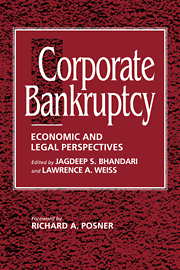Book contents
- Frontmatter
- Contents
- List of tables and figures
- Foreword by the HONORABLE RICHARD A. POSNER
- Preface
- Part I The role of credit
- Part II Bankruptcy as a reflection of the creditors' implicit bargain
- Part III Beyond the basic creditors' bargain
- 9 Bargaining after the fall and the contours of the absolute priority rule
- 10 On the nature of bankruptcy: An essay on bankruptcy sharing and the creditors' bargain
- 11 A simple noncooperative bargaining model of corporate reorganizations
- 12 Commentary on “On the nature of bankruptcy”: bankruptcy, priority, and economics
- 13 Bankruptcy and risk allocation
- 14 The corporate bankruptcy decision
- 15 Bargaining over equity's share in the bankruptcy reorganization of large, publicly held companies
- 16 Bankruptcy resolution: Direct costs and violation of priority of claims
- 17 The costs of conflict resolution and financial distress: Evidence from the Texaco-Pennzoil litigation
- 18 Survey of evidence on business bankruptcy
- Part IV Workouts or bargaining in the shadow of bankruptcy
- Part V Alternatives to bankruptcy and the creditors' bargain
- Part VI Experience of other countries
- Index
17 - The costs of conflict resolution and financial distress: Evidence from the Texaco-Pennzoil litigation
Published online by Cambridge University Press: 10 December 2009
- Frontmatter
- Contents
- List of tables and figures
- Foreword by the HONORABLE RICHARD A. POSNER
- Preface
- Part I The role of credit
- Part II Bankruptcy as a reflection of the creditors' implicit bargain
- Part III Beyond the basic creditors' bargain
- 9 Bargaining after the fall and the contours of the absolute priority rule
- 10 On the nature of bankruptcy: An essay on bankruptcy sharing and the creditors' bargain
- 11 A simple noncooperative bargaining model of corporate reorganizations
- 12 Commentary on “On the nature of bankruptcy”: bankruptcy, priority, and economics
- 13 Bankruptcy and risk allocation
- 14 The corporate bankruptcy decision
- 15 Bargaining over equity's share in the bankruptcy reorganization of large, publicly held companies
- 16 Bankruptcy resolution: Direct costs and violation of priority of claims
- 17 The costs of conflict resolution and financial distress: Evidence from the Texaco-Pennzoil litigation
- 18 Survey of evidence on business bankruptcy
- Part IV Workouts or bargaining in the shadow of bankruptcy
- Part V Alternatives to bankruptcy and the creditors' bargain
- Part VI Experience of other countries
- Index
Summary
Introduction
From 1984 to 1988 Texaco and Pennzoil were engaged in a legal battle over Texaco's usurpation of Pennzoil in the takeover of the Getty Oil Company. The stakes were huge: the original jury award called for a payment of more than $10 billion; the companies ultimately settled for $3 billion. The Texaco-Pennzoil case presents a unique experiment for studying debt burdens and bargaining costs. Market assessments of the prospects of both parties in a prolonged dispute are rarely as observable as they are in the Texaco-Pennzoil case. Further, unlike in most other litigation settings and in almost all bankruptcy cases, the burden imposed on Texaco did not have a collateral effect on future cash flows.
This article examines the abnormal returns earned by the shareholders of Texaco and Pennzoil over the course of the dispute. A clear pattern emerges. Events affecting the size of the transfer resulted in opposite but asymmetric returns to the two companies. When its obligation to Pennzoil was increased, Texaco's value fell by far more than Pennzoil's rose; the opposite reaction occurred for events reducing the expected transfer. These “leakages” in value were enormous: each dollar of value lost by Texaco's shareholders was matched by only about forty cents' gain to the owners of Pennzoil. The ongoing dispute reduced the combined equity value of the two companies by $3.4 billion, over 30 percent of the joint value of the two companies before the dispute arose.
- Type
- Chapter
- Information
- Corporate BankruptcyEconomic and Legal Perspectives, pp. 279 - 297Publisher: Cambridge University PressPrint publication year: 1996



